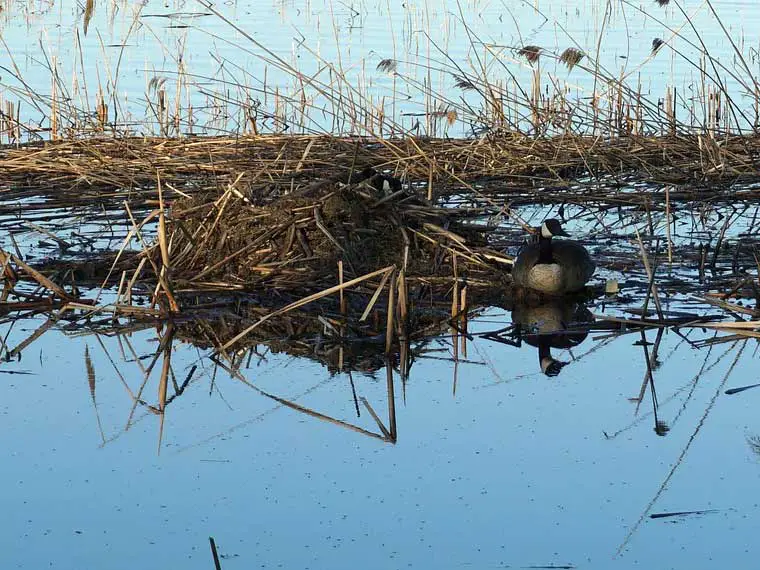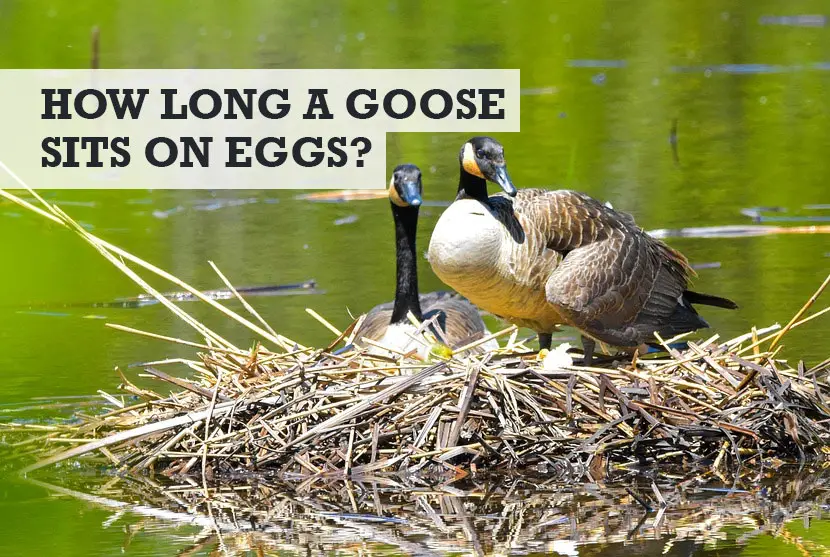A goose might sit on her eggs for up to a month. It takes anywhere between 28-30 days after the last egg is laid for goose eggs to hatch. Eggs from larger species may even take up to 35 days!
Geese lay eggs early in the morning and will likely lay eggs for several days before becoming broody. When you have a broody goose, that means they have stopped laying eggs and are ready to start incubating and caring for her eggs.
The best way to incubate and hatch goose eggs is to leave them up to a broody goose. Depending on the breed of the goose, it may not be the mother you were hoping for to the eggs.
Heavier breeds are prone to breaking eggs due to their clumsiness, while lighter kinds are ideal for incubating eggs as they will sit the term to hatch and raise their babies.
Below you can also find out some strange facts about how long geese might even sit on dead eggs!
Can I incubate the eggs instead?
Goose eggs are difficult to hatch artificially through an incubator. Therefore, it is best to leave it to your broody goose.

How can I determine if my goose will be a good sitter?
There are easy ways to determine if your goose will do an ideal job when it comes to incubating and raising the eggs properly. Younger goose will often not sit to full term, so your best chance would be to wait until she is at least in her second season.
Other than age, another way to determine if your goose will do an adequate job is by knowing the breed of your goose. It is ideal to utilize the motherly instinct of a Brecon Buff Geese, as they are devoted mothers and will sit to term.
Do geese sit on their eggs all day?
Geese leave their nest to eat, drink and bathe. It is common for geese to depart from their eggs for up to an hour a day. However, sometimes younger geese who are broody for the first time refuse to leave their nest. Refusing to leave the nest is very dangerous because if your goose is not eating or drinking, it may die on the nest.
With younger geese, you may have to force it off the nest once or twice a day so it can eat and drink. To remove the goose from the nest, you will have to lift her and be extremely careful that her feet do not break the eggs.
To know whether your goose has been leaving the nest, feel her weight to ensure she is not getting too thin. You may finish the eggs off in an incubator or under a broody Muscovy duck if the goose’s health is declining from not leaving the nest.
Your goose needs to leave the nest to take care of itself. Not only does it keep the mother goose healthy, but it also benefits the eggs. When she bathes, she brings back moisture on her feathers. The dampness creates the perfect humidity level for the eggs to hatch correctly.
Reasons geese leave their eggs
Knowing why your goose may be leaving their eggs unattended may help ease the stress in your mind. It is natural for your goose to leave its eggs several times a day for short periods. However, if your goose is departing for long durations of time more frequently, it could be cause for concern. Here are reasons your goose may be leaving her eggs:
1. In search of food and water
Food and water are vital to your mother gooses health. It is common for them to spend 10-15 minutes several times a day to find food. Some geese will not leave the nest at all, and in that case, you will have to force them out to preserve their health. However, if your goose is straying for extended periods trying to locate food or water, it can be detrimental to the eggs. To make their trips shorter, you can place food and water nearby, so they do not have to wander so far to find their resources.
2. Mothering instinct
Geese typically start sitting on their eggs after they have produced between 12 and 15 eggs. They wait this long because that is usually the time they become broody. Before becoming broody, the goose will allow its eggs to experience the environmental temperature surrounding them. Once it feels like it has laid enough eggs, it will start sitting on them. It is common for the goose to leave their eggs in the beginning stages of production as it has not become broody yet.
3. Spoiled eggs
Ruined eggs are another reason for a goose abandoning its eggs. After a goose realizes its eggs are spoiled, it is common for them to walk away and give up on the nest. In this case, it is best to inspect all the eggs and hatch the good eggs in an incubator.
4. Trained and conditioned
Once a goose knows to walk away from its eggs after laying them, it can be hard to break the habit. Farmers train geese to do this to harvest their eggs. Before purchasing a goose, it is vital to follow up with the previous owner to ensure they have not trained it to do that.
5. Disturbances
Disturbances from humans or predators may cause your goose to abandon her eggs. Broody geese prefer safe, quiet nesting areas.
6. After hatching their first goslings
It is common for a goose to leave after the eggs have hatched. They do this to start teaching the new hungry goslings how to feed. It is only caused for concern if it abandons unhatched eggs.
How to get a goose to sit on eggs?
Unfortunately, there is no way to force your goose to sit on eggs, but you can encourage her by providing an inviting nest. I recommend a deep bed of shavings somewhere quiet and protected.
If that doesn’t work, consider purchasing a nesting box. A nesting box is a goose house made specifically for your goose to incubate her eggs. However, geese like to feel safe when brooding eggs, so it is best to place them in a place where they can’t see outdoors from their nesting box.
How long will a goose sit on dead eggs?
A goose will sit on dead eggs until she realizes that they are bad. This might take as little as 24 hours, but sound geese have been known to sit on dead eggs for days on ebd.
Related questions
How often do geese leave their eggs?
She leaves her nest two to three times a day to eat, spend some time with the male, etc. While she’s gone, she covers her eggs with the down feathers to keep them warm. She’s only gone 10 to 15 minutes at a time, and the down will insulate her eggs for that long, which is typical of most geese and ducks.
What temperature do goose eggs hatch?
If incubating goose eggs, they need to be at a temperature of 99.5F for the duration of incubation with a forced air incubator or 100.5F for a still air incubator. After lockdown, you should lower the temp to 98-99F to increase the oxygen levels for the goslings. Once they have internally pipped, they will start using their lungs to breathe air.
Do geese lay eggs every day?
Depending on the species of geese, nesting waterfowl can produce one egg every 24 to 48 hours. Each egg is fertilized and formed as it travels through the female reproductive tract. Ducks lay one egg per day, geese lay one egg every day and a half, and swans lay one egg every two days.
What do newborn geese eat?
Goslings and ducklings are ready for feed and water when they arrive. Use crumbled chick or poult starter for the first week to 10 days.
How can you tell if a Canadian goose is male or female?
In male Canadian geese, the crown (head) is sizeable and broader than the female, and the male neck is thicker than the female. The female’s neck is shorter and slimmer. Both sexes have different-looking tails feathers also.
You might also like…
Image in header via https://pixabay.com/photos/nature-wildlife-waterfowl-6252196/

